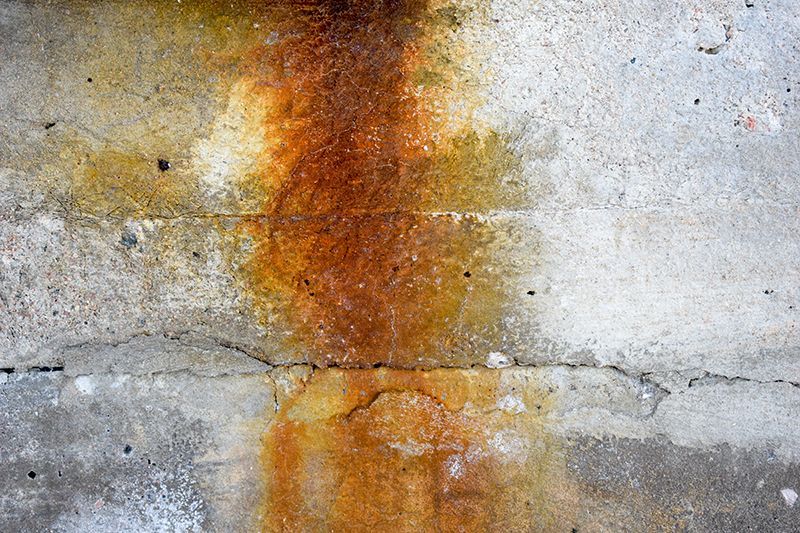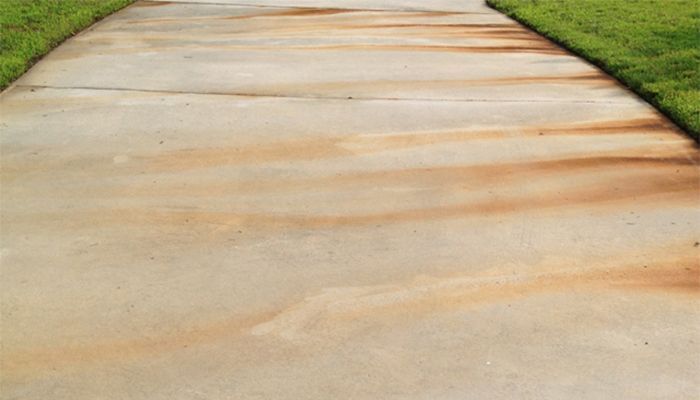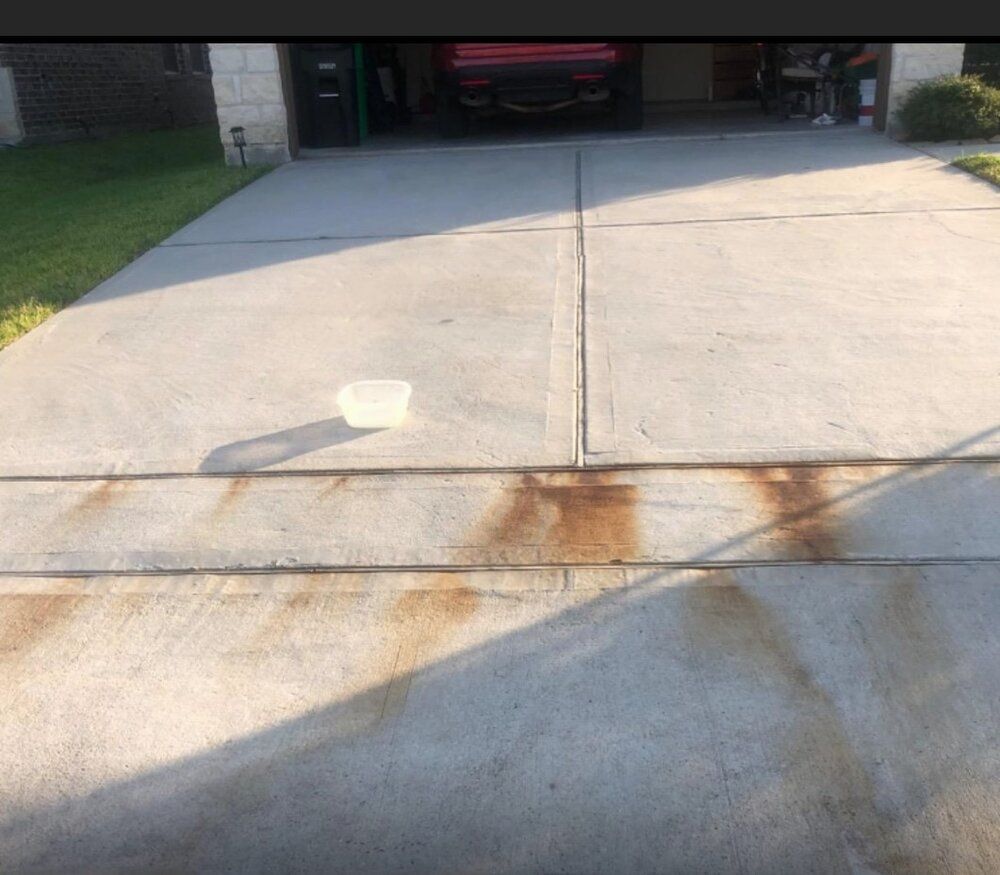Available Now
How to Clean Rust Off a Concrete Driveway
How to Clean Rust Off a Concrete Driveway

To remove rust from a concrete driveway, follow these steps: Gather materials, choose a method like lemon juice or commercial rust cleaner, apply it, scrub gently, rinse, and prevent future rust.
- Rust's Impact: Rust stains on your concrete driveway diminish your property's appearance and can lead to concrete damage if untreated.
- Driveway's Significance: Maintaining your driveway is vital for aesthetics and longevity, as it's a prominent part of your home's exterior.
- Understanding Rust: Rust forms when metal objects exposed to moisture react with concrete, leading to iron oxide (rust) formation. Prompt removal is crucial.
- Materials Needed: Gather materials like warm water, dish soap, lemon juice, commercial rust cleaner, WD-40, brushes, and protective gear.
- Effective Methods: Explore various methods for rust removal, including warm water and dish soap, lemon juice, commercial rust removers, WD-40, and rust-removing paste (baking soda and laundry detergent).
When it comes to your home's exterior, few things are as frustrating as unsightly rust stains on your concrete driveway. Those reddish-brown blemishes not only mar the appearance of your property but can also lead to concrete degradation if left untreated. If you're considering a major driveway overhaul, you might think about the different options available, including
investing in a brand new concrete driveway. But before diving into that, let's see how to clean rust off a concrete driveway using various effective methods.
Introduction
Your driveway isn't just a path to your home; it's also one of the first things guests and passersby notice.
Ensuring your driveway's health is not only crucial for aesthetic reasons but also for its longevity. Over time, rust can eat away at the concrete surface, leading to costly repairs. And while you're at it, don't miss out on understanding the importance and steps of
sealing your concrete driveway for added protection.
Understanding Rust on Concrete

Before diving into rust removal methods, let's understand how rust forms on concrete surfaces. If you're considering laying out a new driveway or renovating an existing one, knowing how to adequately prepare and seal a new concrete driveway can save you from future rust and other related issues.
When metal objects like tools, nails, or even the rims of your car come into contact with concrete and are exposed to moisture, a chemical reaction occurs. This reaction, called oxidation, leads to the formation of iron oxide, commonly known as rust.
Rust not only mars the appearance of your driveway but can also be a sign of potential structural issues. If left unaddressed, it can cause concrete to crack and crumble, leading to costly repairs. That's why it's essential to promptly remove rust stains.
| Table 1: Rust Removal Methods | |||||||
|---|---|---|---|---|---|---|---|
| Method | Materials Needed | Effectiveness | Ease of Use | Cost | Safety Precautions | DIY or Commercial | Additional Tips |
| Warm Water and Dish Soap Mix | Warm water, dish soap | Effective for mild | Simple and safe | Low cost with items | Work in ventilated area, wear gloves | DIY | Avoid wire brush for concrete. |
| Lemon Juice Treatment | Fresh lemon, brush | Effective for mild | Simple and safe | Low cost with items | None | DIY | May require longer soaking for stains. |
| Commercial Rust Cleaners | Rust remover product, brush | Suitable for stubborn | Follow product label | Cost varies by brand | Wear protective gear, well-ventilated area | Commercial | Scrubbing may be necessary. |
| WD-40 and Elbow Grease | WD-40, stiff brush | Effective for stubborn | Requires effort | Moderate cost | Work in well-ventilated area, wear gloves | DIY | Vigorous scrubbing may be needed. |
| Baking Soda and Laundry Detergent | Baking soda, laundry detergent | Effective for stubborn | Simple and safe | Low cost with items | None | DIY | Create a thick paste for best results. |
Materials Needed
Before we get into the methods, let's gather the materials and tools you'll need:
- Warm Water: You'll use this for several methods.
- Dish Soap: For creating a cleaning mixture.
- Lemon Juice: An effective natural rust remover.
- Commercial Rust Cleaner: Choose one suitable for concrete.
- WD-40 Multi-Use Product: Known for rust removal.
- Baking Soda: Useful for creating a rust-removing paste.
- Laundry Detergent: Mix with baking soda.
- Brushes: Stiff-bristle brushes for scrubbing.
- Spray Bottle: To apply solutions.
- Protective Gear: Gloves and eye protection.
- Safety: Always work in a well-ventilated area and follow safety instructions on product labels.
Now that we're well-equipped let's explore the methods to tackle those pesky rust stains.
Method 1: Warm Water and Dish Soap Mix

This method involves creating a simple cleaning solution to break down rust stains. Here's how:
- Mix Solution: In a bucket, combine warm water and a few drops of dish soap. Stir until it forms a soapy mixture.
- Apply to Stains: Pour the soapy mixture onto the rust stains on your driveway.
- Scrub Gently: Use a stiff-bristle brush to scrub the stains gently. Avoid using a wire brush, as it can scratch the concrete.
- Rinse and Air Dry: Rinse the area with clean water and allow it to air dry.
This method is excellent for mild rust stains and a safe starting point.
Method 2: Lemon Juice Treatment
Did you know that the citric acid in lemon juice can work wonders on rust stains? Here's how to apply this natural remedy:
- Apply Lemon Juice: Squeeze fresh lemon juice directly onto the rust stains.
- Let It Soak: Allow the lemon juice to sit on the stains for at least 5-10 minutes.
- Scrub and Rinse: Use a stiff brush to scrub the stains, then rinse with clean water.
- Allow to air dry.
Method 3: Commercial Rust Cleaners
If the rust stains are stubborn, consider using a commercial rust cleaner:
- Choose the Right Product: Select a rust remover suitable for concrete surfaces. Follow the manufacturer's instructions.
- Apply as Directed: Apply the rust remover as directed on the product label. Typically, you'll need to spray or brush it onto the stains.
- Safety Precautions: Wear protective gear and work in a well-ventilated area. Some rust removers may contain strong chemicals.
- Scrub if Needed: Depending on the product, you may need to scrub the stains with a brush.
- Rinse and Air Dry: Rinse the treated area thoroughly with water and allow it to air dry.
Commercial rust removers are formulated to tackle tough rust stains effectively.
Method 4: WD-40 and Elbow Grease
Believe it or not, WD-40 Multi-Use Product isn't just for squeaky hinges; it's a potent rust remover too:
- Apply WD-40: Spray WD-40 directly onto the rust stains.
- Scrub Vigorously: Use a stiff brush and some elbow grease to scrub the stains vigorously.
- Rinse and Dry: Rinse off the WD-40 with clean water and allow the area to dry.
WD-40's unique formulation makes rust removal a breeze.
Method 5: Baking Soda and Laundry Detergent
For a homemade rust-removing paste, try this method:
- Mix Paste: Combine baking soda and laundry detergent to create a paste. Add water as needed to achieve a thick consistency.
- Apply Paste: Spread the paste onto the rust stains.
- Scrub Gently: Use a brush to scrub the paste into the stains, working it in.
- Rinse and Dry: Rinse off the paste with water and allow the area to dry.
- This DIY solution is effective and gentle on your concrete driveway.
Alternative Methods and Tips
In addition to these primary methods, there are alternative approaches worth considering. For instance, white vinegar and salt can be combined into a paste and applied to rust stains. Let it sit for a few hours, then scrub and rinse. Always wear protective gear and test any method on a small, inconspicuous area of your driveway first.
Preventative Measures

Once your driveway is rust-free, take steps to prevent future stains:
- Regular Cleaning: Regularly sweep and clean your driveway to remove metal debris.
- Sealants and Coatings: Consider applying a concrete sealant or coating to create a protective barrier against rust formation.
- Keep Metal Off: Avoid leaving metal objects, such as tools or gardening equipment, on the concrete surface for extended periods.
By following these preventative measures, you can maintain a rust-free driveway for years to come.
| Table 2: Preventative Measures | |
|---|---|
| Preventative Measures | Description |
| Regular Cleaning | Sweep and clean the driveway regularly to remove metal debris. |
| Sealants and Coatings | Consider applying a concrete sealant or coating for rust prevention. |
| Keep Metal Off | Avoid leaving metal objects on the concrete surface for extended periods. |
Conclusion
A rust-free concrete driveway not only enhances your home's curb appeal but also ensures the longevity of your driveway. With these effective rust removal methods and preventative measures, you can bid farewell to those unsightly stains. So, roll up your sleeves, choose a method that suits you best, and get ready to restore your concrete driveway to its pristine glory. Your home will thank you for it!
Additional Resources and References
To further expand your knowledge on rust removal and concrete maintenance, explore these valuable resources and references. They offer expert insights and additional tips to keep your concrete driveway rust-free.
https://www.trottaspowerwashing.com/blog/concrete-driveway-maintenance-tips/
FAQs
How do you remove rust from a concrete driveway?
- You can use methods like warm water and dish soap, lemon juice, commercial rust removers, WD-40, or a baking soda and laundry detergent paste. Choose the method that suits your situation best.
Does CLR remove rust from concrete?
- CLR (Calcium Lime Rust) is primarily designed for removing calcium, lime, and rust from various surfaces. While it may work on rust stains, it's best to use products specifically formulated for rust removal on concrete.
Can you pressure wash rust off concrete?
- Pressure washing can help remove surface rust stains. However, for deeply embedded rust, it's recommended to use a rust remover in combination with pressure washing.
Does WD-40 remove rust?
- Yes, WD-40 is known for its rust-removing properties. It can effectively dissolve rust and make it easier to scrub away.
How to clean rust off a concrete driveway with vinegar?
- You can create a paste with white vinegar and salt, apply it to rust stains, let it sit, scrub, and rinse. Alternatively, try lemon juice as a natural option.
GET IN TOUCH
Need more information? Speak to one of our experts and get personalised advice on your project to bring your vision to life. Contact us today to schedule your consultation or request a free consultation.
Contact Us
Thank you for submitting a quote request. We'll get back to you shortly!
Oops, there was an error in sending your message.
Please try again later.
YOU MIGHT ALSO LIKE...
YOU MIGHT ALSO LIKE...



Fast & Free Estimates, Call Now.
Contact us anytime via phone call or email.
Cairns' Best Concreters since 2010.
Licensee: Michael Stubbs
QBCC:
1267154
This is a referral .website, please visit our Privacy Policy and Terms of Service for more information.
Services
Working hours
- Mon - Sun
- -
Don't be shy give us a call! If we're too busy to take your call right away, one of our specialists will get back to you as soon as possible.
All Rights Reserved | Concrete Cairns
New Paragraph



